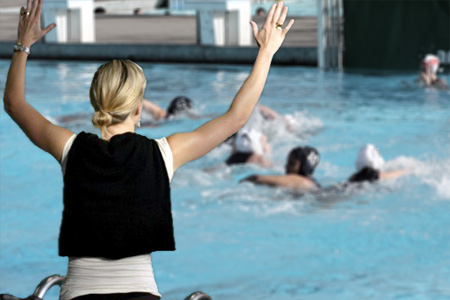 What kind of woman takes on the job of head coach for the very first women’s water polo team at the Virginia Military Institute (VMI), a school that admitted women less than 14 years ago and where less than 15% of the student population is female?
What kind of woman takes on the job of head coach for the very first women’s water polo team at the Virginia Military Institute (VMI), a school that admitted women less than 14 years ago and where less than 15% of the student population is female?
That would be Anna Phelps (née Hewitson) ’97, who fast-tracked her college career to graduate in 3 years, who helped her CMS (Claremont-Mudd-Scripps) water polo team capture the SCIAC conference championship her first year on the squad, and who now finds herself on the cusp of seeing “a major lifelong dream come true” in securing a college coaching position in an emerging sport for women.
“Having gone to a women’s college,” Phelps reflects, “it’s really cool to be part of this development.”
Growing up in central Oregon, coached by Jim McMaster, “who basically brought water polo from California to Oregon,” Phelps knew she wanted to attend college and compete in the pools of Southern California. At the high school level, she’d already been named an All-American and was part of the junior national team. Her best days, though, were yet to come.
Even though it was a smaller school than she’d envisioned for herself, Phelps chose Scripps after visiting her boyfriend (now husband, Jeff Phelps) at Claremont McKenna College, staying on Scripps’s campus with someone on the water polo team, and speaking with professors. She visited other schools in the SCIAC conference but found Scripps the perfect oasis and “the absolutely right choice,” where she found an “automatic network of friends” and a “fantastic mentor” in Mike Sutton, who then coached the men’s water polo team.
“One of the best players I’ve ever coached,” sums up Mike Sutton, Director of Athletics for CMS. “She elevated everyone around her.”
“She’s such an awesome person, you just want to hang out with her,” adds Leigh Jasper ’98. “She talked me and my roommate into playing water polo although neither of us had ever played. There was a lot of passion among the players because the sport wasn’t big or well known.”
Back in 1994, scholarships for women’s water polo players were in their infancy, and the Olympics did not yet recognize the sport as “official.” By talking other high school swimmers into giving water polo a try, Phelps helped mold a team of Claremont-Mudd-Scripps players who would quickly reign as conference champs and would participate in CMS’s domination in the SCIAC conference from 1994 to 1997 as the All-Sports Champions.
Since graduating with a political science major and marrying Jeff, Anna and her husband have taken turns working “real jobs” (pharmaceutical sales manager for her and investment banker for him) and coaching water polo. They took a year off to travel in Spain and Mexico before settling close to family back in Oregon, where they established themselves as valued coaches at storied Lincoln High School in Portland, the first public high school in the Pacific Northwest.
For Phelps, there’s much more to the sport than the physical aspects.
“I don’t fit the stereotype because I’m about 5’7″ and 130 pounds, which is small for a player,” Phelps explains. “For me, sports were always the backbone to leadership and character.”
From her high school and college coaches Phelps and her husband learned “an attitude of respect for the process and the value of the sport,” says Sutton. “I can’t imagine one of their players being arrogant. Their personalities have driven the program at their high school because they have developed a community where the sport can thrive.”
“We have really high expectations for our students and the parents at Lincoln have supported that,” Phelps agrees. “It’s a team sport, so, once a student makes a commitment, that’s important. We take character building really seriously.”
With such an ideal job, why would Phelps consider moving across the country to start a women’s program at a military academy?
“When we found out about the opportunity,” explains Phelps, “we thought we should check it out. Very few opportunities come up to just coach a women’s water polo team. Usually the same person coaches the men’s and women’s teams, and very few women coach men’s teams at the collegiate level.”
As part of an effort to grow their population of female students, VMI complied with NCAA requirements for Division I programs by adding another women’s team sport. Water polo, they determined, would best fit the character of the school.
“Is it hard for women at VMI? Yes. Is it hard for the men? Yes,” Phelps says. “About half the students will enlist in one of the branches of the military, and it’s a more regimented experience than your average liberal arts college But women are completely accepted at this school, and, after spending time with the girls on the swim team here, I walked away feeling I could build a program at a school where students get a great education. Getting paid to do that year-round is just mind-boggling.”

